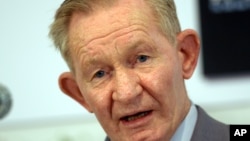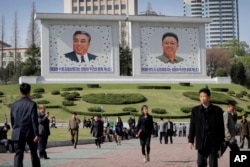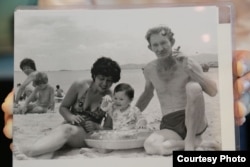Families of North Korean abductees feel forgotten by the world, despite the increased international focus on widespread North Korean human rights abuses that a United Nations report described as "on a scale unparalleled in the modern world."
Hwang In-cheol's father was among the 47 passengers and crew aboard a Korea Air (KAL) airliner that in 1969 was hijacked into North Korea. Most were released under intense international pressure, but 11 of them, including Hwang's father, who was a journalist and outspoken critic of the then Kim Il Sung regime, have not been allowed to return nor permitted to communicate with his family.
"To this day, 48 years later, my father and the rest of the 11 unreturned abductees remain forcefully detained in North Korea and they have been forgotten," said Hwang, who heads an advocacy group called the KAL Abductees' Repatriation Committee that is trying to bring international media attention to this issue.
After the 1950-53 Korean War, North Korea returned most prisoners-of-war, but reportedly forced thousands of South Korean citizens to remain, to help rebuild national industries, schools and other basic state functions. In the decades after, thousands more were reportedly abducted by North Korea. Most of them were fishermen, who were purportedly taken to gain intelligence or serve some propaganda purpose in the ongoing inter-Korean cold war.
Hwang’s father is one of over 500 Korean victims who are still being held in the North, and of that number 300 are more than 70 years old, according to the Citizen's Alliance for North Korean Human Rights (NKHR), an advocacy group that has worked closely on this issue with victims' families and the United Nations Working Group on Enforced or Involuntary Disappearances (WGEID.)
These abduction cases remain unresolved, as escalating inter-Korean tensions over the North's nuclear program have blocked any cooperation on humanitarian issues.
Hwang said the South Korea Human Rights Commission has provided "no help" to secure the release of abductees, or to allow families to communicate with them.
Charles Jenkins
North Korea also stands accused of abducting a number of Japanese and other foreign nationals in the 1970s and 1980s, reportedly to train North Korean spies.
Hitomi Soga, a Japanese abductee, who was forcibly taken from a beach in Northern Japan along with her mother in 1978, married Charles Jenkins while in captivity. Jenkins was a U.S Army deserter to North Korea who died Tuesday at the age of 77.
Jenkins later said he was a “fool” for defecting to North Korea in 1965, after drinking 10 beers, to avoid being sent to fight in the Vietnam War. He was abused and tortured during his initial years in captivity.
In 1980 he met and soon after married Soga, who was compelled to teach Japanese language and culture to North Korean agents.
In 2002, then North Korean leader Kim Jong-il admitted that his government had abducted 13 Japanese citizens and, in an attempt to improve relations with Japan,. Soga and four other Japanese abductees were allowed to travel to Japan for a short visit, but they refused to return to North Korea.
In 2004 Jenkins and the two daughters he had with Soga were also allowed to leave.
An agreement between Japan and North Korea to ease some sanctions in exchange for an investigation into the status of abduction victims has since fallen apart over Pyongyang's lack of cooperation and its continued testing of nuclear weapons.
"There was a brief opening, there was a brief ray of sunshine that came in with Charles Jenkins and others being able to get out, and being able to say what they knew, and then the door slam shut, the curtains were drawn, and there has been nothing further," said Phil Robertson, deputy director in Asia for Human Rights Watch.
Jenkins had also confirmed that Anocha Panjoy, a Thai woman who disappeared in 1978 while in Macau, had also been abducted by North Korea. Panjoy’s family has voiced frustration that the Thai government has done little to secure her release over the years.
North denials
Robertson said North Korea is now in "complete denial on the case of abductions of foreign nationals." And he has called on the international community to speak out strongly and increase pressure on the Kim Jong Un government to release abductees, hold those responsible for the abductions accountable, and improve human rights conditions in the country.
"These are crimes against humanity that have to be answered for by North Korea. Speaking quietly is not an option at this point," said Robertson.
The United Nations Security Council also met this week to discuss a General Assembly recommendation to refer North Korea to the International Criminal Court for crimes against humanity, based on a 2014 Commission of Inquiry report documenting a network of political prison camps, and systematic human rights abuses, including murder, enslavement, torture, rape, and other sexual violence.
China, North Korea’s key ally on the Security Council, has blocked any further action on the measure.
North Korea’s Permanent Mission to the United Nations on Tuesday released a statement condemning the Security Council meeting as a "desperate act of the hostile forces" (led by the U.S.) and called the allegations of human rights violations “fictitious."
Youmi Kim in Seoul contributed to this report







